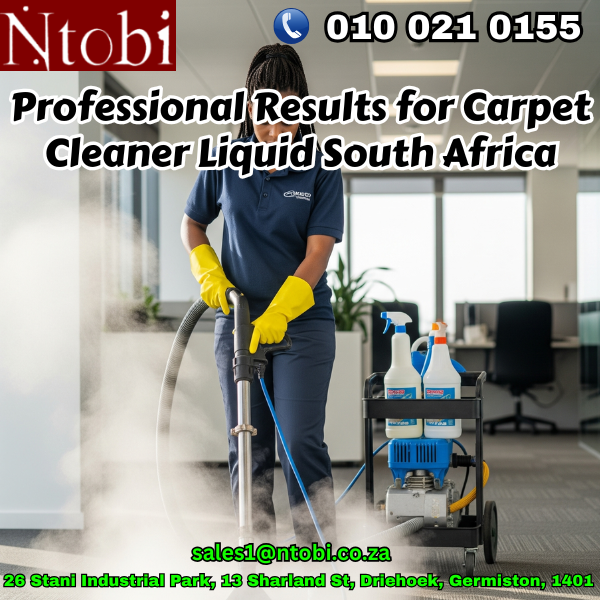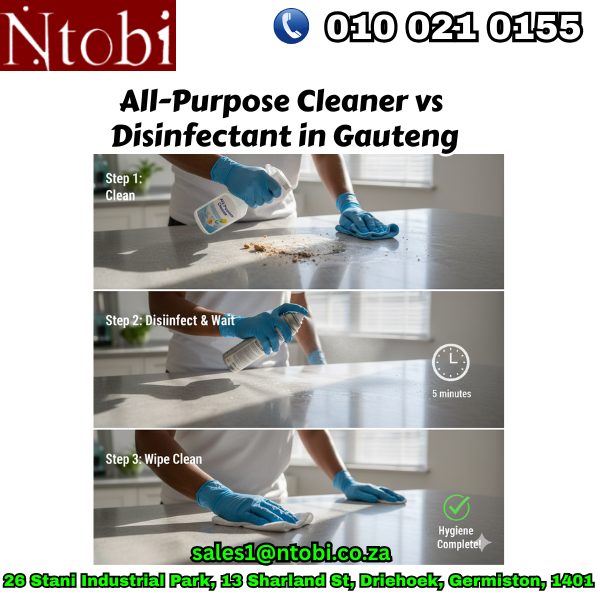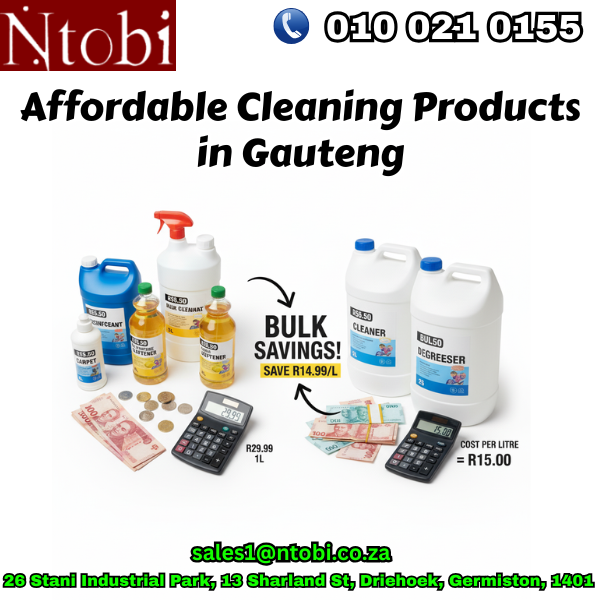Key Takeaways
| Aspect | Key Information |
|---|---|
| Best Options | Professional-grade liquids, eco-friendly solutions, concentrated formulas |
| Top Suppliers | Ntobi Cleaning supplies bulk and retail options across South Africa |
| Cost Range | R50-R300 depending on concentration and brand |
| Application | Hot water extraction, steam cleaning, spot treatment |
| Avoid | Bleach, harsh chemicals, untested DIY mixtures |
| Professional Results | Use proper dilution ratios and quality equipment |
Carpet cleaner liquid forms the backbone of any effective carpet maintenance routine in South Africa. Whether you’re tackling stubborn stains in your Johannesburg home or maintaining commercial carpets in Cape Town, the right cleaning solution makes all the difference. Professional carpet cleaning liquids contain specialised surfactants and enzymes that break down dirt, oils, and organic matter that regular vacuuming simply can’t reach.
Ntobi Cleaning stands as one of South Africa’s leading suppliers of professional carpet cleaning solutions. We provide everything from concentrated carpet shampoos to eco-friendly cleaning liquids, steam cleaning solutions, and specialised stain removers. Our bulk cleaning supplies cater to both commercial cleaning companies and residential users who demand professional-grade results.
Understanding Carpet Cleaning Liquid Types in South Africa
Different carpets need different approaches, and that’s where understanding your cleaning liquid options becomes crucial. Synthetic carpets respond well to alkaline-based cleaners, whilst natural fibres like wool require gentler, pH-neutral formulations.
Synthetic Carpet Cleaners:
- High-alkaline formulas (pH 9-11)
- Excellent for nylon and polyester carpets
- Removes heavy soiling and traffic patterns
- Cost-effective for regular maintenance
Natural Fibre Cleaners:
- pH-neutral formulations (pH 6-8)
- Gentle on wool and silk carpets
- Prevents colour bleeding and shrinkage
- Higher cost but essential for delicate materials
Concentrated vs Ready-to-Use Solutions:
- Concentrated liquids offer better value
- Mixing ratios typically 1:40 to 1:80
- Ready-to-use convenient for small jobs
- Professional concentrates provide consistent results
The South African market offers numerous imported and locally manufactured options. Local suppliers like Ntobi stock both international brands and locally produced alternatives that perform equally well at fraction of the cost.
Professional Application Techniques and Equipment Requirements
Getting professional results isn’t just about the liquid you choose – application technique matters enormously. Hot water extraction remains the most effective method for deep carpet cleaning, requiring temperatures between 60-80°C for optimal cleaning power.
Equipment Compatibility:
- Check manufacturer recommendations
- Some liquids work only with specific machines
- Portable extractors vs truck-mounted systems
- Different dilution ratios for different equipment
Pre-treatment Steps:
- Vacuum thoroughly to remove loose debris
- Apply pre-spray for heavily soiled areas
- Allow dwell time (usually 5-10 minutes)
- Extract using proper overlapping patterns
The extraction process should maintain steady, overlapping strokes. Too fast and you won’t extract enough moisture; too slow and you risk over-wetting the carpet backing. Professional cleaners typically aim for 6-8 inches per second movement speed.
Post-Cleaning Procedures:
- Apply carpet protector if requested
- Ensure proper ventilation for drying
- Place furniture pads under table legs
- Advise clients on drying times
Chemical Composition and Safety Considerations
Understanding what goes into carpet cleaning liquids helps you make informed choices and use products safely. Most professional formulations contain surfactants, builders, solvents, and various additives that enhance cleaning performance.
Primary Ingredients:
- Surfactants: Reduce surface tension, allowing better penetration
- Builders: Soften water and enhance cleaning action
- Enzymes: Break down organic stains and odours
- Optical brighteners: Make carpets appear cleaner and brighter
Safety data sheets become particularly important when working with concentrated products. Many carpet cleaners contain ingredients that require proper ventilation and protective equipment during use.
Health and Safety Requirements:
- Always wear gloves when handling concentrates
- Ensure adequate ventilation in work areas
- Never mix different cleaning products
- Store chemicals away from children and pets
South African regulations require proper labelling of cleaning chemicals. The Ntobi shop provides comprehensive safety information with all professional cleaning products, ensuring compliance with local workplace safety standards.
Environmental Considerations:
- Biodegradable formulations increasingly popular
- Phosphate-free options better for water systems
- Concentrated products reduce packaging waste
- VOC-compliant formulations protect indoor air quality
Cost Analysis and Bulk Purchasing Benefits
Smart purchasing strategies can significantly reduce your carpet cleaning costs whilst maintaining quality results. Understanding the true cost per application helps you evaluate different products effectively.
| Product Type | Initial Cost | Coverage | Cost per m² |
|---|---|---|---|
| Ready-to-use 5L | R180-R250 | 100-150m² | R1.20-R2.50 |
| Concentrate 5L | R300-R450 | 800-1200m² | R0.25-R0.56 |
| Bulk Concentrate 20L | R900-R1400 | 3200-4800m² | R0.18-R0.44 |
Bulk Purchasing Advantages:
- Significant cost savings per application
- Consistent product availability
- Reduced packaging waste
- Better supplier relationships
Professional cleaning companies often achieve 40-60% cost savings through bulk purchasing arrangements. Ntobi’s bulk cleaning supplies programme offers tiered pricing that rewards larger volume purchases.
Hidden Costs to Consider:
- Storage requirements for bulk products
- Shelf life limitations
- Mixing equipment needs
- Training staff on proper dilution
Stain-Specific Cleaning Solutions
Different types of stains require targeted approaches for effective removal. Generic carpet cleaners work well for general soiling, but specific stains often need specialised treatment products.
Protein-Based Stains:
- Blood, vomit, food spills
- Require enzyme-based cleaners
- Cold water extraction prevents setting
- Multiple treatments sometimes necessary
Oil and Grease Stains:
- Traffic lane graying
- Food oils, automotive fluids
- Solvent-based pre-sprays most effective
- Hot water helps emulsify oils
Tannin Stains:
- Tea, coffee, wine, fruit juices
- Acidic rinse agents help removal
- Quick action prevents permanent setting
- Some require oxidising bleaches
Pet-Related Issues:
- Urine requires enzymatic treatment
- Odour elimination needs bacterial action
- Sub-surface contamination common
- Multiple cleaning cycles often required
Professional carpet cleaners maintain inventories of specialised stain removal products alongside their general cleaning liquids. This approach ensures they can handle any situation that arises during routine cleaning work.

Regional Availability and Supplier Networks
South Africa’s carpet cleaning supply market varies significantly by region, with major centres having better product availability and competitive pricing. Understanding your local supply network helps ensure consistent product access.
Major Supply Hubs:
- Johannesburg/Pretoria: Widest product selection, competitive pricing
- Cape Town: Good availability, some import delays
- Durban: Growing market, increasing options
- Port Elizabeth: Limited selection, higher costs
Distribution Challenges:
- Rural areas face limited availability
- Transport costs affect pricing outside major centres
- Import dependencies for specialised products
- Local manufacturing growing but limited
Ntobi’s contact information includes details for their distribution network across South Africa. They’ve established regional depots to improve product availability and reduce delivery times for professional cleaners.
Online vs Physical Suppliers:
- Online ordering offers convenience and comparison shopping
- Physical suppliers provide immediate availability
- Technical support often better from local suppliers
- Bulk deliveries more cost-effective than courier services
Maintenance Schedules and Product Rotation
Effective carpet maintenance involves more than just using quality cleaning liquids – timing and rotation of products plays a crucial role in maintaining carpet appearance and extending its lifespan.
Commercial Maintenance Schedule:
- Daily: Vacuuming and spot cleaning
- Weekly: Low-moisture cleaning of high-traffic areas
- Monthly: Deep extraction cleaning
- Quarterly: Protective treatments and stain guard application
Residential Maintenance:
- Weekly: Thorough vacuuming
- Monthly: Spot treatment of stains
- Bi-annually: Professional deep cleaning
- Annually: Protective treatment renewal
Product Rotation Benefits:
- Prevents residue buildup from single products
- Addresses different types of soiling
- Reduces risk of carpet damage from over-use
- Maintains optimal cleaning performance
Professional cleaners often alternate between alkaline and acidic cleaning cycles to maintain carpet pH balance and prevent soap residue accumulation. This approach requires careful record-keeping but delivers superior long-term results.
What Not to Put in Carpet Cleaner?
Several household products and chemicals should never be added to carpet cleaning machines, as they can damage equipment, carpets, or create safety hazards. Understanding these restrictions prevents expensive mistakes and equipment damage.
Never Add These Items:
- Bleach or chlorine products: Can permanently discolour carpets and damage machine seals
- Laundry detergent: Creates excessive foam that can damage pumps and motors
- Dish soap: Too many suds will overflow and damage electrical components
- Fabric softener: Leaves residue that attracts more dirt
- Pine-based cleaners: Can leave sticky residues (though pine gel has specific uses)
Dangerous Chemical Combinations:
- Mixing ammonia-based and chlorine products creates toxic gas
- Combining acidic and alkaline cleaners neutralises both
- Adding hydrogen peroxide to other chemicals can cause reactions
- Homemade mixtures often lack proper pH balance
Equipment Damage Risks:
- Wrong chemicals can corrode internal components
- Excessive foaming damages pumps and motors
- Acidic products can eat through seals and gaskets
- Undiluted products can clog spray jets and filters
The temptation to create your own cleaning solutions or boost commercial products with household chemicals is strong, especially when facing tough stains. However, professional carpet cleaning liquids are carefully formulated and tested – additions usually cause more problems than they solve.
Always stick to manufacturer recommendations for your specific carpet cleaning equipment. Most warranty agreements become void if you use unapproved chemicals in professional machines.
Can I Just Use Water in My Carpet Cleaner?
Water alone provides limited cleaning effectiveness, though it can be useful in specific situations. Understanding when water-only cleaning works and when you need proper cleaning solutions helps you make informed decisions.
Water-Only Cleaning Limitations:
- Removes only water-soluble dirt and debris
- Cannot break down oils, greases, or protein-based stains
- Fails to neutralise odours effectively
- No sanitising properties
- May actually spread oily stains
When Water Might Work:
- Fresh spills before they set
- Final rinse cycles to remove cleaning residue
- Very light maintenance between professional cleanings
- Testing carpet colorfastness before chemical treatment
Temperature Considerations:
- Hot water (60-80°C) performs better than cold
- Heat helps break down some types of soiling
- Too hot can damage carpet fibres or backing
- Equipment limitations may restrict temperature
The Science Behind Cleaning Solutions: Carpet cleaning liquids contain surfactants that reduce water’s surface tension, allowing it to penetrate carpet fibres more effectively. These chemicals also emulsify oils and suspend dirt particles so they can be extracted rather than redistributed.
Professional Recommendation: Even budget-conscious users should invest in proper carpet cleaning solutions. The improved cleaning effectiveness and carpet protection far outweigh the modest additional cost. Water-only cleaning often requires multiple passes and may leave carpets looking dingy or feeling sticky.
Risk of Water-Only Cleaning:
- Over-wetting carpet backing
- Promoting mould and mildew growth
- Leaving residual dirt in carpet fibres
- Reducing carpet lifespan through incomplete cleaning
Can I Put Vinegar in a Carpet Cleaner?
White vinegar gets frequently recommended as a natural carpet cleaning solution, but using it in carpet cleaning machines requires careful consideration. Understanding both benefits and risks helps you decide whether vinegar fits your cleaning needs.
Potential Benefits of Vinegar:
- Natural acidic properties help remove alkaline residues
- Can neutralise some odours effectively
- Environmentally friendly and non-toxic
- Inexpensive compared to commercial products
- May help with certain types of stains
Significant Risks and Drawbacks:
- Acidic nature can damage natural fibre carpets (wool, silk)
- May void equipment warranties if not approved by manufacturer
- Can corrode metal components in cleaning machines
- Strong odour that takes time to dissipate
- May set protein-based stains permanently
Proper Vinegar Dilution: If you choose to use vinegar despite the risks, proper dilution becomes critical. A solution of 1 cup white vinegar to 1 gallon of warm water provides mild acidity without excessive risk.
Equipment Compatibility Issues:
- Check manufacturer guidelines before use
- Some machines specifically prohibit acidic solutions
- Rinse thoroughly after vinegar cleaning
- Consider corrosion risks to pumps and seals
Professional Perspective: Most professional carpet cleaners avoid vinegar due to unpredictable results and equipment risks. Purpose-made carpet cleaning solutions provide consistent results with proper pH balance and equipment compatibility.
Better Alternatives:
- Commercial acidic rinse agents designed for carpets
- Enzymatic cleaners for organic stains and odours
- pH-neutral cleaning solutions for regular maintenance
- Professional products with proven track records
The risks of equipment damage and unpredictable cleaning results generally outweigh any potential cost savings from using household vinegar.
What Not to Do After Carpet Cleaning?
Post-cleaning care significantly affects both the immediate appearance and long-term condition of your carpets. Avoiding common mistakes ensures you get maximum value from professional carpet cleaning services.
Immediate Post-Cleaning Mistakes:
- Walking on damp carpets with shoes: Transfers new dirt and may cause staining
- Replacing furniture immediately: Can create rust stains or indentations
- Closing windows and doors: Prevents proper air circulation and extends drying time
- Using fans or heaters incorrectly: Can cause uneven drying and potential mould issues
Traffic Management:
- Keep foot traffic to minimum for 6-12 hours
- Use clean socks or shoe covers if walking necessary
- Place towels at entry points
- Restrict access to heavily cleaned areas
Furniture Replacement Guidelines:
- Wait until carpets are completely dry (usually 6-24 hours)
- Use furniture pads or blocks to prevent indentations
- Avoid dragging furniture across damp carpets
- Check for any remaining moisture before replacing items
Drying Process Optimisation:
- Open windows for cross-ventilation
- Use air conditioning or dehumidifiers in humid conditions
- Point fans toward cleaned areas but not directly at wet spots
- Maintain indoor temperature between 20-25°C
Common Long-term Mistakes:
- Waiting too long before next professional cleaning
- Using store-bought carpet cleaners too soon after professional service
- Neglecting regular vacuuming routine
- Ignoring manufacturer care recommendations
Stain Prevention:
- Address spills immediately with clean, dry cloths
- Avoid scrubbing or rubbing stains
- Use appropriate spot cleaning products only
- Call professionals for large or persistent stains
Proper post-cleaning care extends the time between professional services and maintains carpet appearance longer. The investment in professional cleaning deserves protection through appropriate follow-up care.
Frequently Asked Questions
Q: How often should I professionally clean my carpets?
A: Most residential carpets benefit from professional cleaning every 12-18 months, whilst high-traffic commercial areas may need quarterly service. Factors like foot traffic, pets, and environmental conditions affect frequency requirements.
Q: What’s the difference between carpet shampoo and extraction cleaning?
A: Carpet shampooing applies cleaning solution and agitates it into fibres, whilst extraction cleaning uses hot water and powerful suction to remove both dirt and cleaning residue. Extraction typically provides better results and faster drying.
Q: Can carpet cleaning remove pet odours permanently?
A: Professional enzyme-based cleaners can eliminate pet odours by breaking down organic compounds. However, severe contamination may require multiple treatments and possibly carpet pad replacement.
Q: Is it worth buying a carpet cleaning machine for home use?
A: Rental machines work well for maintenance cleaning between professional services. However, they lack the power and heating capability of professional equipment, making them less effective for deep cleaning.
Q: How long do carpets take to dry after professional cleaning?
A: Typical drying times range from 6-24 hours depending on humidity, air circulation, carpet density, and cleaning method used. Proper ventilation significantly reduces drying time.
For professional carpet cleaning supplies and expert advice, visit Ntobi Cleaning’s location or explore their comprehensive range of cleaning solutions.







Leave a Reply